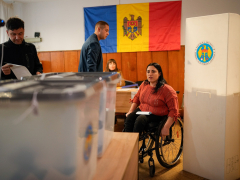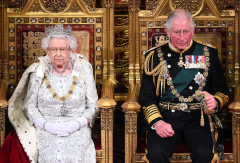Moldova’s ruling pro-West governing party won a majority in the country’s tense Sunday elections, beating pro-Russian parties by a wide margin amid reported attempts to violently disrupt the vote and allegations of interference by Russia.
Results from more than 99 percent of the polling stations counted by Monday noon showed the Party of Action and Solidarity (PAS) clearly in the lead, despite analysis and opinion polls before the vote suggesting that pro-Russian parties would come close and possibly upset the ruling party’s parliamentary majority.
Recommended Stories
list of 4 items
- list 1 of 4Moldova bans pro-Russian parties ahead of Sunday’s election
- list 2 of 4Moldova holds parliamentary elections hit by claims of Russian interference
- list 3 of 4Moldova’s pro-EU party takes lead in election as vote counting under way
- list 4 of 4Moldova’s pro-EU party wins election hit by Russian interference claims
end of list
The small country is located between Ukraine and Romania. One of Europe’s poorest states, it was part of the Soviet Republic until 1991. The breakaway, semi-autonomous region of Transnistria, which lies along the border with Ukraine, has traditionally supported ties with Russia.
As a result, in recent years, Moldova has emerged as a battleground for influence between Russia and the West.
In a September 9 speech at the European Parliament, Moldovan President Maia Sandu, founder of PAS, declared that this election would be “the most consequential” in the country’s history.
For Moldovans, the elections represented a crucial turning point. The small country with Russia’s war in Ukraine on its doorstep could either continue on its current path towards European Union membership, or it could fall back into the old fold of Russian influence.
Ultimately, despite reports of pro-Russian groups threatening violence, with at least three people arrested in Moldova, and several bomb scares reported at polling booths abroad, the Moldovan diaspora played a key role in delivering a pro-EU victory.

What was the outcome of Moldova’s election?
Nearly all votes cast at polling stations had been counted by Monday. Some 1.6 million people cast their votes, making about 52.2 percent of eligible voters, which is higher than in previous elections.
The ruling pro-EU PAS, led by parliament president and PAS cofounder, Igor Grosu, won 50.16 percent of the vote and about 55 of the 101 seats in parliament, translating to a comfortable majority government, according to the country’s election agency.
The current prime minister, Dorin Recean, appointed by Sandu in February 2023, is expected to retain his position.
The pro-Russian Patriotic Electoral Bloc (BEP), an alliance of four parties led by former president and Russian ally Igor Dodon, came in a far second with 24.19 percent of the vote. The party won 26 seats in parliament. Two parties within the bloc, Heart of Moldova and Moldova Mare, were banned from participating in the election amid allegations they had received illicit funding from Russia.
In third place was the Alternative Party, which is also pro-EU with 7.97 percent of the vote, securing eight parliamentary seats.
Our Party, a populist group, and the conservative Democracy at Home party, respectively, won just more than 6 percent and 5 percent of the vote. That allowed them entry into parliament for the first time with 6 seats each.
What had polls predicted?
Opinion polls had suggested a much tighter race between the ruling PAS and the BEP, which was predicted to come a close second. That scenario would have disrupted PAS’s present control of parliament, potentially forcing it into an uncomfortable coalition with the BEP, and slowing down pro-EU reforms.
Before the Sunday polls, politicians and their supporters on both sides of the debate campaigned intensely on the streets and on TV, but also on online platforms such as TikTok, in an attempt to reach young people who make up about a quarter of the population.
What were the key issues?
EU accession was the single most important issue on the ballot this election. Under President Sandu, Moldova applied to join the EU in early 2022, just after Russia’s February invasion of Ukraine. Chisinau’s goal, alongside a better economy, has been to obtain security guarantees like its neighbour, Romania, which is a member of the EU and of the North Atlantic Treaty Alliance (NATO).
In July 2022, the EU granted Moldova – as well as Ukraine – candidate status, on the condition that democracy, human and minority rights, and rule of law reforms are made. European Commission President Ursula von der Leyen at the time declared that the future of Moldova was in the EU.
However, while President Sandu’s PAS is eager to achieve Moldova’s EU membership by 2028 when her term expires, she has accused Moscow of attempting to scupper this plan in order to continue wielding influence over a country it once controlled.
Russia has considerable support in Moldova, and backs a breakaway, autonomous enclave – Transnistria, located along its border with Ukraine. About 1,500 Russian troops are present there, and the enclave’s government has requested Russian annexation several times.
In a referendum vote last October, just more than 50 percent of Moldovans voted “yes” to joining the EU, a tight margin of victory that was seen as a predictor of this week’s parliamentary elections.
At the time, President Sandu blamed “dirty interference” from Russia for her camp’s thin victory.

Did Russia interfere in these elections?
During the run-up to Moldova’s election, the authorities have repeatedly accused Moscow of conducting a “hybrid war” – offline





